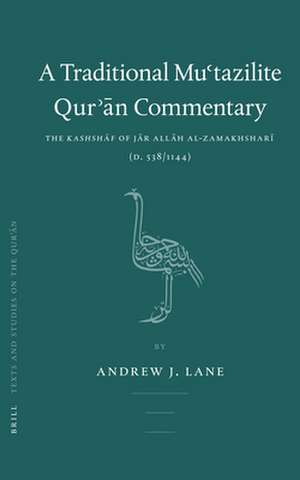A Traditional Mu'tazilite Qur'ān Commentary: The <i>Kashshāf</i> of Jār Allāh al-Zamakhsharī (d.538/1144): Texts and Studies on the Qurʾān, cartea 2
Autor Andrew Laneen Limba Engleză Hardback – 22 dec 2005
The book is divided into five chapters, supplemented by nine appendices. After a chapter on the author’s life and writings (an annotated list of which is given in an appendix), there follow four chapters that focus on the Kashshāf itself. These deal with the history of the text, its structure and method, the traditions it contains and the sources the author relied on for it.
Although both al-Zamakhsharī’s name and the title of his commentary are well known, very little is actually known about either the author or the work. This book presents a more complete and nuanced picture of each.
Din seria Texts and Studies on the Qurʾān
- 18%
 Preț: 1025.22 lei
Preț: 1025.22 lei - 18%
 Preț: 653.04 lei
Preț: 653.04 lei - 18%
 Preț: 818.42 lei
Preț: 818.42 lei - 18%
 Preț: 529.75 lei
Preț: 529.75 lei - 18%
 Preț: 1284.21 lei
Preț: 1284.21 lei - 18%
 Preț: 634.22 lei
Preț: 634.22 lei - 15%
 Preț: 515.15 lei
Preț: 515.15 lei - 18%
 Preț: 642.16 lei
Preț: 642.16 lei - 15%
 Preț: 443.79 lei
Preț: 443.79 lei - 15%
 Preț: 524.57 lei
Preț: 524.57 lei - 18%
 Preț: 758.04 lei
Preț: 758.04 lei - 18%
 Preț: 562.05 lei
Preț: 562.05 lei - 18%
 Preț: 611.06 lei
Preț: 611.06 lei - 18%
 Preț: 694.86 lei
Preț: 694.86 lei - 18%
 Preț: 883.86 lei
Preț: 883.86 lei - 18%
 Preț: 1109.45 lei
Preț: 1109.45 lei - 18%
 Preț: 1373.02 lei
Preț: 1373.02 lei - 18%
 Preț: 808.54 lei
Preț: 808.54 lei - 18%
 Preț: 1137.12 lei
Preț: 1137.12 lei
Preț: 999.27 lei
Preț vechi: 1218.63 lei
-18% Nou
Puncte Express: 1499
Preț estimativ în valută:
191.23€ • 207.65$ • 160.64£
191.23€ • 207.65$ • 160.64£
Carte indisponibilă temporar
Doresc să fiu notificat când acest titlu va fi disponibil:
Se trimite...
Preluare comenzi: 021 569.72.76
Specificații
ISBN-13: 9789004147003
ISBN-10: 9004147004
Pagini: 418
Dimensiuni: 165 x 244 x 33 mm
Greutate: 0.94 kg
Editura: Brill
Colecția Brill
Seria Texts and Studies on the Qurʾān
ISBN-10: 9004147004
Pagini: 418
Dimensiuni: 165 x 244 x 33 mm
Greutate: 0.94 kg
Editura: Brill
Colecția Brill
Seria Texts and Studies on the Qurʾān
Public țintă
This book will be of interest to scholars, specialists and graduate students interested in the history of the Qurʾān and its exegetical tradition.Notă biografică
Andrew J. Lane, Ph.D. (2003) in Islamic Studies, University of Toronto, teaches coursed in Arabic and Islamitic studies at the University. He has presented and published papers on qur'ānic exegesis. He is also interested in questions of Muslim-Christian dialogue.
Recenzii
“…an excellent source book for the study of al-Kashshāf, as well as its origins and impact on later generations.”
Binyamin Abrahamov in Jerusalem Studies in Arabic and Islam 36 (2009), 573-574.
Binyamin Abrahamov in Jerusalem Studies in Arabic and Islam 36 (2009), 573-574.
